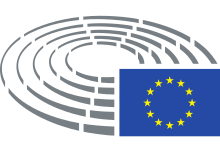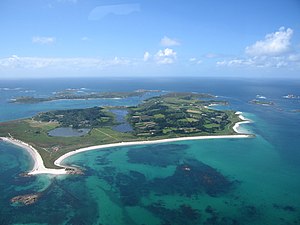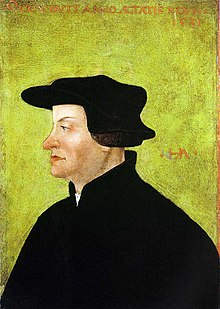Portal:Europe
| Main | Geography | Projects |
|
|
Europe is a continent located entirely in the Northern Hemisphere and mostly in the Eastern Hemisphere. It comprises the westernmost peninsulas of the continental landmass of Eurasia, and is bordered by the Arctic Ocean to the north, the Atlantic Ocean to the west, the Mediterranean Sea to the south, and Asia to the east. Europe is commonly considered to be separated from Asia by the watershed of the Ural Mountains, the Ural River, the Caspian Sea, the Greater Caucasus, the Black Sea, and the waterways of the Turkish Straits. Although much of this border is over land, Europe is generally accorded the status of a full continent because of its great physical size and the weight of history and tradition.
Europe covers about 10,180,000 km2 (3,930,000 sq mi), or 2% of the Earth's surface (6.8% of land area), making it the second smallest continent (using the seven-continent model). Politically, Europe is divided into about fifty sovereign states, of which Russia is the largest and most populous, spanning 39% of the continent and comprising 15% of its population. Europe had a total population of about 741 million (about 11% of the world population), as of 2018. The European climate is largely affected by warm Atlantic currents that temper winters and summers on much of the continent, even at latitudes along which the climate in Asia and North America is severe. Further from the sea, seasonal differences are more noticeable than close to the coast.
The history of Europe concerns itself with the discovery and collection, the study, organization and presentation and the interpretation of past events and affairs of the people of Europe since the beginning of written records. During the Neolithic era and the time of the Indo-European migrations, Europe saw human inflows from east and southeast and subsequent important cultural and material exchange. The period known as classical antiquity began with the emergence of the city-states of ancient Greece. Later, the Roman Empire came to dominate the entire Mediterranean basin. The fall of the Roman Empire in AD 476 traditionally marks the start of the Middle Ages. Beginning in the 14th century a Renaissance of knowledge challenged traditional doctrines in science and theology. Simultaneously, the Protestant Reformation set up Protestant churches primarily in Germany, Scandinavia and England. After 1800, the Industrial Revolution brought prosperity to Britain and Western Europe. The main European powers set up colonies in most of the Americas and Africa, and parts of Asia. In the 20th century, World War I and World War II resulted in massive numbers of deaths. The Cold War dominated European geo-politics from 1947 to 1989. After the fall of the Iron Curtain, the European countries grew together.
The culture of Europe is rooted in the art, architecture, film, different types of music, economic, literature, and philosophy that originated from the continent of Europe. European culture is largely rooted in what is often referred to as its "common cultural heritage".
The economy of Europe comprises more than 744 million people in 50 countries. The formation of the European Union (EU) and in 1999, the introduction of a unified currency, the Euro, brings participating European countries closer through the convenience of a shared currency and has led to a stronger European cash flow. The difference in wealth across Europe can be seen roughly in former Cold War divide, with some countries breaching the divide (Greece, Estonia, Portugal, Slovenia and the Czech Republic). Whilst most European states have a GDP per capita higher than the world's average and are very highly developed (Liechtenstein, Luxembourg, Monaco, Andorra, Norway, Sweden, Denmark, Netherlands, Switzerland, United Kingdom, Ireland, Germany), some European economies, despite their position over the world's average in the Human Development Index, are poorer.
Featured article -

The European Parliament (EP) is one of the two legislative bodies of the European Union and one of its seven institutions. Together with the Council of the European Union (known as the Council and informally as the Council of Ministers), it adopts European legislation, following a proposal by the European Commission. The Parliament is composed of 720 members (MEPs), after the June 2024 European elections, from a previous 705 MEPs. It represents the second-largest democratic electorate in the world (after the Parliament of India), with an electorate of around 375 million eligible voters in 2024.
Since 1979, the Parliament has been directly elected every five years by the citizens of the European Union through universal suffrage. Voter turnout in parliamentary elections decreased each time after 1979 until 2019, when voter turnout increased by eight percentage points, and rose above 50% for the first time since 1994. The voting age is 18 in all EU member states except for Malta, Belgium, Austria and Germany, where it is 16, and Greece, where it is 17. (Full article...)
Featured location -
The Isle of Portland is a tied island, 6 kilometres (4 mi) long by 2.7 kilometres (1.7 mi) wide, in the English Channel. The southern tip, Portland Bill, lies 8 kilometres (5 mi) south of the resort of Weymouth, forming the southernmost point of the county of Dorset, England. A barrier beach called Chesil Beach joins Portland with mainland England. The A354 road passes down the Portland end of the beach and then over the Fleet Lagoon by bridge to the mainland. The population of Portland is 13,417.
Portland is a central part of the Jurassic Coast, a World Heritage Site on the Dorset and east Devon coast, important for its geology and landforms. Portland stone, a limestone famous for its use in British and world architecture, including St Paul's Cathedral and the United Nations Headquarters, continues to be quarried here. (Full article...)
Featured portrait
 |
In the News
- 1 February 2025 – Russian invasion of Ukraine
- Attacks on civilians in the Russian invasion of Ukraine
- A Russian missile strike on a residential building in Poltava, Ukraine, reportedly kills at least fourteen people and injures at least 17 others. A separate strike kills three police officers in Sumy Oblast. (Reuters)
- 1 February 2025 –
- A fire at a retirement home in Bouffémont, Val-d'Oise, France, kills three people and leaves nine others injured. (AP)
- 31 January 2025 – Russian invasion of Ukraine
- Odesa strikes
- Russian forces launch ballistic missiles at the centre of Odesa and its port, severely damaging numerous civilian buildings, including the historic Bristol Hotel. At least two people are reportedly injured. (Reuters)
- 31 January 2025 – 2025 Yugosphere retail boycotts
- Following boycotts in Croatia on January 24, and in conjunction with a follow-up boycott in the country, residents of Bosnia and Herzegovina, Serbia, Montenegro, and North Macedonia start a boycott of retail stores in response to rising prices. (Intellinews)
Updated: 3:05, 3 February 2025
Categories
Featured biography -
Huldrych or Ulrich Zwingli (1 January 1484 – 11 October 1531) was a Swiss Christian theologian, musician, and leader of the Reformation in Switzerland. Born during a time of emerging Swiss patriotism and increasing criticism of the Swiss mercenary system, he attended the University of Vienna and the University of Basel, a scholarly center of Renaissance humanism. He continued his studies while he served as a pastor in Glarus and later in Einsiedeln, where he was influenced by the writings of Erasmus.
In 1519, Zwingli became the Leutpriester (people's priest) of the Grossmünster in Zürich where he began to preach ideas on reform of the Catholic Church. In his first public controversy in 1522, he attacked the custom of fasting during Lent. In his publications, he noted corruption in the ecclesiastical hierarchy, promoted clerical marriage, and attacked the use of images in places of worship. Among his most notable contributions to the Reformation was his expository preaching, starting in 1519, through the Gospel of Matthew, before eventually using Biblical exegesis to go through the entire New Testament, a radical departure from the Catholic mass. In 1525, he introduced a new communion liturgy to replace the Mass. He also clashed with the Anabaptists, which resulted in their persecution. Historians have debated whether or not he turned Zürich into a theocracy. (Full article...)
Featured picture
 |
Related portals
Major Religions in Europe
Northern Europe
Western Europe
Central Europe
Eastern Europe, Balkans and Caucasus
Southern Europe
Featured panorama
 |
Topics
Associated Wikimedia
The following Wikimedia Foundation sister projects provide more on this subject:
-
Commons
Free media repository -
Wikibooks
Free textbooks and manuals -
Wikidata
Free knowledge base -
Wikinews
Free-content news -
Wikiquote
Collection of quotations -
Wikisource
Free-content library -
Wikispecies
Directory of species -
Wikiversity
Free learning tools -
Wikivoyage
Free travel guide -
Wiktionary
Dictionary and thesaurus


























